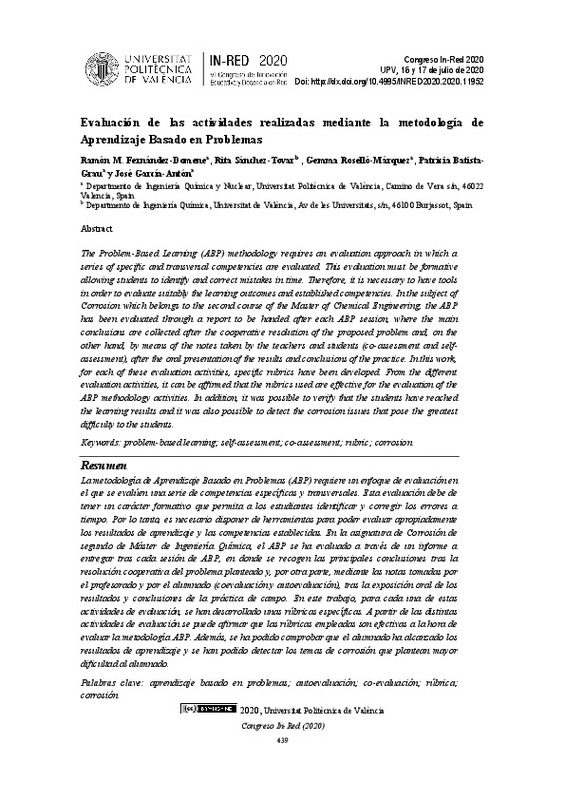JavaScript is disabled for your browser. Some features of this site may not work without it.
Buscar en RiuNet
Listar
Mi cuenta
Estadísticas
Ayuda RiuNet
Admin. UPV
Evaluación de las actividades realizadas mediante la metodología de Aprendizaje Basado en Problemas
Mostrar el registro completo del ítem
Fernández-Domene, RM.; Sánchez-Tovar, R.; Roselló-Márquez, G.; Batista-Grau, P.; Leiva García, R.; García-Antón, J. (2021). Evaluación de las actividades realizadas mediante la metodología de Aprendizaje Basado en Problemas. En IN-RED 2020: VI Congreso de Innovación Educativa y Docencia en Red. Editorial Universitat Politècnica de València. 439-448. https://doi.org/10.4995/INRED2020.2020.11952
Por favor, use este identificador para citar o enlazar este ítem: http://hdl.handle.net/10251/160856
Ficheros en el ítem
Metadatos del ítem
| Título: | Evaluación de las actividades realizadas mediante la metodología de Aprendizaje Basado en Problemas | |
| Autor: | Batista-Grau, Patricia Leiva García, Rafael | |
| Entidad UPV: |
|
|
| Fecha difusión: |
|
|
| Resumen: |
[ES] La metodología de Aprendizaje Basado en Problemas (ABP) requiere un enfoque de evaluación en el que se evalúen una serie de competencias específicas y transversales. Esta evaluación debe de tener un carácter formativo ...[+]
[EN] The Problem-Based Learning (ABP) methodology requires an evaluation approach in which a series of specific and transversal competencies are evaluated. This evaluation must be formative allowing students to identify ...[+]
|
|
| Palabras clave: |
|
|
| Derechos de uso: | Reconocimiento - No comercial - Sin obra derivada (by-nc-nd) | |
| ISBN: |
|
|
| Fuente: |
|
|
| DOI: |
|
|
| Editorial: |
|
|
| Versión del editor: | http://ocs.editorial.upv.es/index.php/INRED/INRED2020/paper/view/11952 | |
| Título del congreso: |
|
|
| Lugar del congreso: |
|
|
| Fecha congreso: |
|
|
| Tipo: |
|









